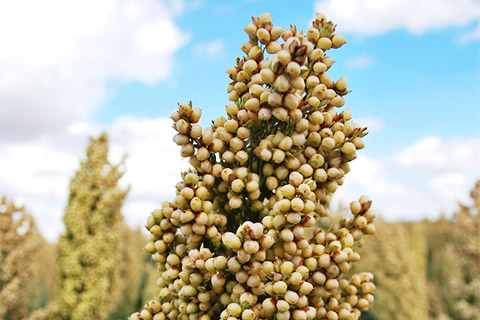Globally Nuseed is focused on four crops with excellent genetic potential for advancing agronomic performance and developing new end-use products — canola, carinata, sunflowers, and profiled below, sorghum.
Nuseed sorghum quick facts:
- Top 3 sorghum market share position globally
- Strength in developing hybrids for food, feed, and fuel
- Recently introduced early sorghum category
- Developing both human and animal nutrition traits
- Leading efforts to link agronomic performance, new cropping patterns, and high yield potential
- Brazil, the US, and Argentina are key target geographies
Nuseed has developed an industry-changing category of ultra-early sorghum hybrids, that reduces the maturity by 20 days while maintaining industry-leading yields and disease resistance. This key advancement will enable increased sorghum acres in the northern hemisphere.
“Sorghum growers prefer earlier maturing varieties, but most of Nuseed’s competitors are offering later maturing sorghum varieties,” says Leon Streit, Nuseed’s Global R&D Lead.
Between the development of these early sorghum hybrids (allowing expansion into new climatic regions) and growing acknowledgment of sorghum’s cost advantage in comparison to high priced, high input corn the global demand for sorghum is growing.
Sorghum research is led by Nuseed Sorghum Research Leader, Diego Duretto, at the company’s Argentina R&D facilities. This research is in collaboration with Texas-based, Richardson Seeds, a wholly-owned Nuseed subsidiary, that has been in the sorghum business for over half a century. The combined expertise is leading the way in sorghum advancements including yield, maturity, digestibility, agronomic performance, as well as drought and saline tolerance.
Sorghum’s status as an ancient grain is also appealing to consumer markets. Nuseed’s R&D teams have already developed Wholis for human consumption and are exploring the white sorghum segment, which allows the crop to be made into non-GMO, gluten-free flour for tortillas and other food products.

